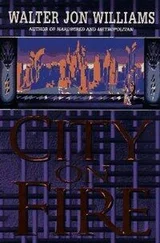Walter Williams - The Rift
Здесь есть возможность читать онлайн «Walter Williams - The Rift» весь текст электронной книги совершенно бесплатно (целиком полную версию без сокращений). В некоторых случаях можно слушать аудио, скачать через торрент в формате fb2 и присутствует краткое содержание. Год выпуска: 2013, Издательство: Baen Books, Жанр: Фантастика и фэнтези, на английском языке. Описание произведения, (предисловие) а так же отзывы посетителей доступны на портале библиотеки ЛибКат.
- Название:The Rift
- Автор:
- Издательство:Baen Books
- Жанр:
- Год:2013
- ISBN:нет данных
- Рейтинг книги:3 / 5. Голосов: 1
-
Избранное:Добавить в избранное
- Отзывы:
-
Ваша оценка:
- 60
- 1
- 2
- 3
- 4
- 5
The Rift: краткое содержание, описание и аннотация
Предлагаем к чтению аннотацию, описание, краткое содержание или предисловие (зависит от того, что написал сам автор книги «The Rift»). Если вы не нашли необходимую информацию о книге — напишите в комментариях, мы постараемся отыскать её.
The Rift — читать онлайн бесплатно полную книгу (весь текст) целиком
Ниже представлен текст книги, разбитый по страницам. Система сохранения места последней прочитанной страницы, позволяет с удобством читать онлайн бесплатно книгу «The Rift», без необходимости каждый раз заново искать на чём Вы остановились. Поставьте закладку, и сможете в любой момент перейти на страницу, на которой закончили чтение.
Интервал:
Закладка:
“So how are the levees up in Iowa?” Pat asked.
“Holding. It was the private levees that broke.”
It had been all Jessica could do to keep from flying north to check the situation personally. But her deputy at Rock Island assured her that there was no significant danger to Corps structures, and she concluded that she would be better employed in Vicksburg, getting her teams up to speed for when the flood waters headed south.
“Private levees,” Pat mused. “Funny we’ve still got so many of ’em.”
“The Corps budget will only do so much,” Jessica said. Corps levees were built to a standard height and width, faced with durable Bermuda grass, and protected by revetments from the river’s tendency to undermine them. But much of the Mississippi’s flood plain was still guarded by levees privately built by local cities, towns, and corporations, and they built what they could afford- to Corps standards when it was possible, but often not.
In the catastrophic floods of 1993, when ten million acres had gone under water, it had been the private levees that had broken, and the Corps levees that stood. When the city of Grand Forks had been submerged by the Red River in the spring of ’97, it had been because the city’s politicians had been reluctant to raise tax rates in order to provide proper flood protection. Upstream, Fargo, with its more realistic government and higher rate of taxation, stayed dry.
Jessica loosened her collar and jacket, headed for her room to change. “What’s for dinner?” she asked.
“There seem to be a lot of breakfast leftovers,” Pat said, following.
Jessica felt her cheeks grow hot. “Sorry,” she said. “I was nervous.”
“I could tell.”
“What else is for dinner?”
“I could make some tuna fish sandwiches. You used up practically everything else in the refrigerator.”
“Tuna is fine.”
Pat was actually a perfectly adequate cook whose capabilities extended well past tuna sandwiches. But he didn’t care about cooking, he didn’t throw his whole being into it, the way Jessica did, to leave the palate delirious and the kitchen a litter of dirty pots and pans.
Pat saved all that for music.
And, strangely enough, for Jessica.
“We could go out, maybe,” Pat said. “And celebrate your ascension.”
Jessica shook her head. “Too much homework,” she said, and looked at the heavy briefcase she’d brought home.
“Okay. Tuna fish it is.”
Jessica followed him into the kitchen. “Why do people say tuna, fish?” she asked.
He looked at her over his shoulder as he opened the pantry door. “Maybe because a tuna is a fish?” he suggested.
“But people don’t call a salmon a salmon fish, or a grouper a grouper fish, or a bass a bass fish.”
“You’ve got a point there.” He took the can of tuna from the shelf, glanced over the unfamiliar kitchen for an opener. He cocked an eye at her. “Didn’t you say you’ve got some homework?”
He hated it when she hovered over him in the kitchen. “You bet,” she said, and headed for her briefcase.
*
We have the following description of the Earthquake from gentlemen who were on board a large barge, and lay at anchor in the Mississippi a few leagues below New Madrid, on the night of the 15th of December. About 2 o’clock all hands were awakened by the first shock; the impression was, that the barge had dragged her anchor and was grounding on gravel; such were the feelings for 60 or 80 seconds, when the shock subsided. The crew were so fully persuaded of the fact of their being aground, that they put out their sounding poles, but found water enough. At seven next morning a second and very severe shock took place. The barge was under way - the river rose several feet; the trees on the shore shook; the banks in large columns tumbled in; hundreds of old trees that had lain perhaps half a century at the bottom of the river, appeared on the surface of the water; the feathered race took to the wing; the canopy was covered with geese and ducks and various other kinds of wild fowl; very little wind; the air was tainted with a nitrous and sulphureous smell; and every thing was truly alarming for several minutes. The shocks continued to the 21st Dec. during that time perhaps one hundred were distinctly felt. From the river St. Francis to the Chickasaw bluffs visible marks of the earthquake were discovered; from that place down, the banks did not appear to have been disturbed. There is one part of this description which we cannot reconcile with philosophic principles, (although we believe the narrative to be true,) that is, the trees which were settled at the bottom of the river appearing on the surface. It must be obvious to every person that those trees must have become specifically heavier than the water before they sunk, and of course after being immersed in the mud must have increased in weight. -We therefore submit the question to the Philosophical Society.
Natchez Weekly Chronicle, January 20,1812
Cover your six o’clock, as the chopper pilots said. Or, in the language of the marketplace, cover your ass.
Jessica Frazetta knew that there were two natural forces that could sneak up on her and wreck the Mississippi Valley, and her career along with it.
The first was flood. The second was earthquake.
Flood and the Corps of Engineers were old acquaintances. The Corps had been fighting the river since well before Colonel of Engineers Robert E. Lee, in the 1850s, had been sent to Missouri to prevent the Mississippi from crabbing sideways into Illinois and stranding St. Louis inland, a mission he had performed with his usual efficiency.
Practically all of the Corps’ efforts in the Mississippi went into controlling the water and keeping river navigation safe. It was to secure these goals that all the levees had been built, the dams, the locks, the revetments, the spillways. For these reasons the Corps had planted lights and buoys, dredged the harbors, charted the depths, pulled snags by the thousands from the bed of the river.
But the second, far more dangerous threat was that of earthquake. Jessica knew that an earthquake of sufficient force could undo hundreds of years of the Corps’ efforts in an instant. The levees, the revetments, the dams, the spillways … all gone at once.
The Mississippi Valley’s last big earthquakes had occurred from 1811-12, when there were less than three thousand people of European descent living west of the Mississippi.
The world of those three thousand, and the thousands more Indians who lived in the area, was torn asunder by three major earthquakes and thousands of aftershocks. The first of the quakes had been estimated as 8.7 on the Richter scale, the second-largest quake in all human history. Fifty thousand square miles were devastated, and millions more suffered damage. Fissures tore open every single acre of farmland. The Mississippi ran backward for a day. Islands vanished, while other islands were formed. Dry land submerged, and the bottoms of lakes and rivers rose dry into the sunlight. The Missouri town of New Madrid, where the quakes had been centered, had been destroyed, and the Mississippi rolled over the remains. The quakes were so powerful that they smashed crockery in Boston, caused panicked people to run into the streets in Charleston, rang church bells in Baltimore, and woke Thomas Jefferson from sleep at Monticello.
The New Madrid fault had remained active through much of the nineteenth century, providing the country an occasional jolt, but it had fallen quiet during the twentieth. And it was during the twentieth century, when memories of the quake had faded, that the Corps built most of its structures in the Mississippi Valley.
Читать дальшеИнтервал:
Закладка:
Похожие книги на «The Rift»
Представляем Вашему вниманию похожие книги на «The Rift» списком для выбора. Мы отобрали схожую по названию и смыслу литературу в надежде предоставить читателям больше вариантов отыскать новые, интересные, ещё непрочитанные произведения.
Обсуждение, отзывы о книге «The Rift» и просто собственные мнения читателей. Оставьте ваши комментарии, напишите, что Вы думаете о произведении, его смысле или главных героях. Укажите что конкретно понравилось, а что нет, и почему Вы так считаете.











